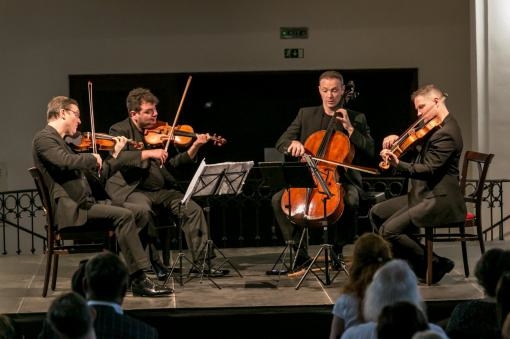The Jerusalem Quartet is one of the world's leading quartet performers for many years and is currently one of the most cited chamber music ensembles. At the Concentus Moraviae festival, violinists Alexander Pavlovsky, Sergei Bresler, violist Ori Kam and cellist Kyril Zlotnikov performed in the Great Chateau of Mikulov Castle with a programme stretching in time from Joseph Haydn up to Béla Bartók. The concert was held under the auspices of the Israeli Ambassador to the Czech Republic, HE Daniel Meron.
The evening started with String Quartet in G major Op. 76, No. 1 by Joseph Haydn. From the very first tones it was clear that the objective of the ensemble – at least in the case of the Haydn's Quartet – was to offer a sophisticated sound of Viennese Classicism with its pure lines, sentimental sweetness and crystal lightness. Particularly impressive were the characteristic classicist sighs of violin played by Alexander Pavlovsky. The strength of the interpretation was, above all, work with pace and dynamics – all the rubatos and subtle suspensions created by the musicians in the composition were then also in a similar manner unanimously expanded on. Even in the musical humour – another important aspect of Haydn's compositional mastery – the performers took good care of it. Elegant classicist finesses alternated with sudden ecstatic bursts of whimsical music, which made a comical contrast with the rest. Appraisal is also deserved by the musicians for having remained faithful to the stylishly refined interpretation throughout. Even greater expectations were raised by the upcoming String Quartet No. 2 in E flat major, Op. 26 by Erich Wolfgang Korngold, known to this day as a pioneer of film music in the first half of the twentieth century.
Already the opening part of the second string quartet revealed why it was Korngold's music to accompany silver screen stars on their road to glory. The author's distinctive instrumentation and melodic style – whose reminiscence also appears in other Hollywood composers' works of the first half of the twentieth century – skilfully balances on the edge of warm confessions and sudden contrasting surfaces using widespread harmonies. In no way, however, can Korngold's string quartet be described as an expressive work, and the musicians have thus crossed the long ford dividing Joseph Haydn's and Erich Wolfgang Korngold's periods, so to say dry-shod. Indeed, already in the second movement, Intermezzo, lightness shines through the surface, elegance and perhaps even certain dance playfulness not only of Korngold's music, but especially of the musical performance of the Jerusalem Quartet. The appropriately chosen level of expressiveness, which did not reach the most aggressive positions, made it possible to combine the two works, so distant in time and style.
The same applies to the most modern composition of the evening, String Quartet No. 4 by Hungarian composer Béla Bartók. Although the composer's work speaks to the listeners to a great extent in a different compositional language, thanks to the sensitive interpretation of the Jerusalem Quartet, the musical message remained in close contact with the compositions by Joseph Haydn and Erich Wolfgang Korngold. Undoubtedly, for the sake of unity, the performers chose the fourth string quartet, which builds its musical effect on both the elements of modern harmony and Hungarian folk music as well as the classical-romantic musical ideal. It was in the last part of the evening that the rhythmic interplay of the ensemble was the most visible in the rubato parts and the joint glissandos in the first part Allegro. The rhythmically pulsating stretches of the second, fourth and fifth movements fulfilled their dramatic purpose, but they never completely turned into violent expressiveness. On the other hand, the musicians made excel long melancholic sections in the third movement, where, due to sophisticated work with dynamics, the audience remained tense with anticipation even after the end of this part. After the final fifth movement with distinctive accompaniments and a characteristic dance rhythm, came an encore consisting of Five Pieces for String Quartet by Ervín Schulhoff and the sweetly painful second movement from Dvořák's "American" String Quartet No. 12.
The Jerusalem Quartet, with its sweet, sophisticated and elegant sound – which the musicians managed to smuggle into completely different musical compositions – offered an insight into the international league of chamber music. However, it is far from being the only world ensemble to perform at the Concentus Moraviae festival. So there may be no need to go far for possible comparisons.
Jerusalem Quartet
Programme:
Joseph Haydn: String Quartet No. 1 in G major, Op. 76
Erich Wolfgang Korngold: String Quartet No. 2 in E flat major, Op. 26
Béla Bartók: String Quartet No. 4
Sunday 9 June 2019, Great Chateau Hall, Mikulov
































No comment added yet..